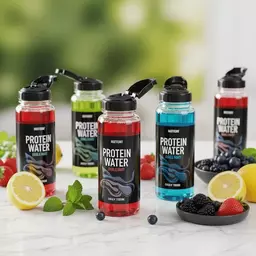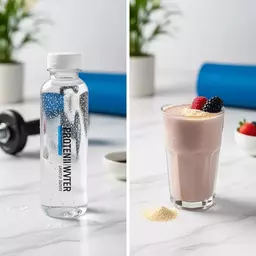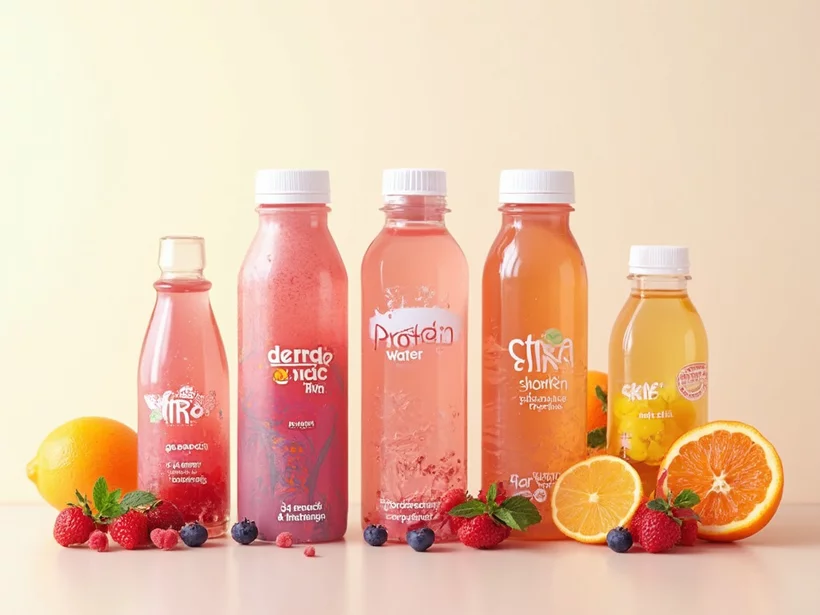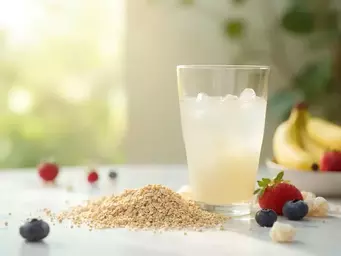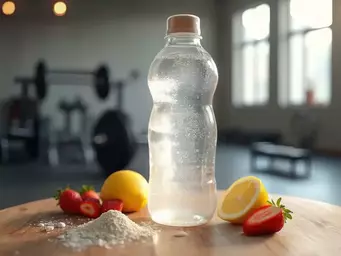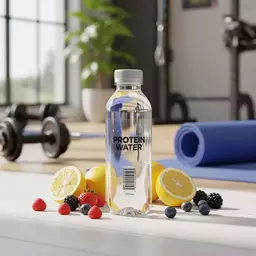Protein Water or Protein Shakes?
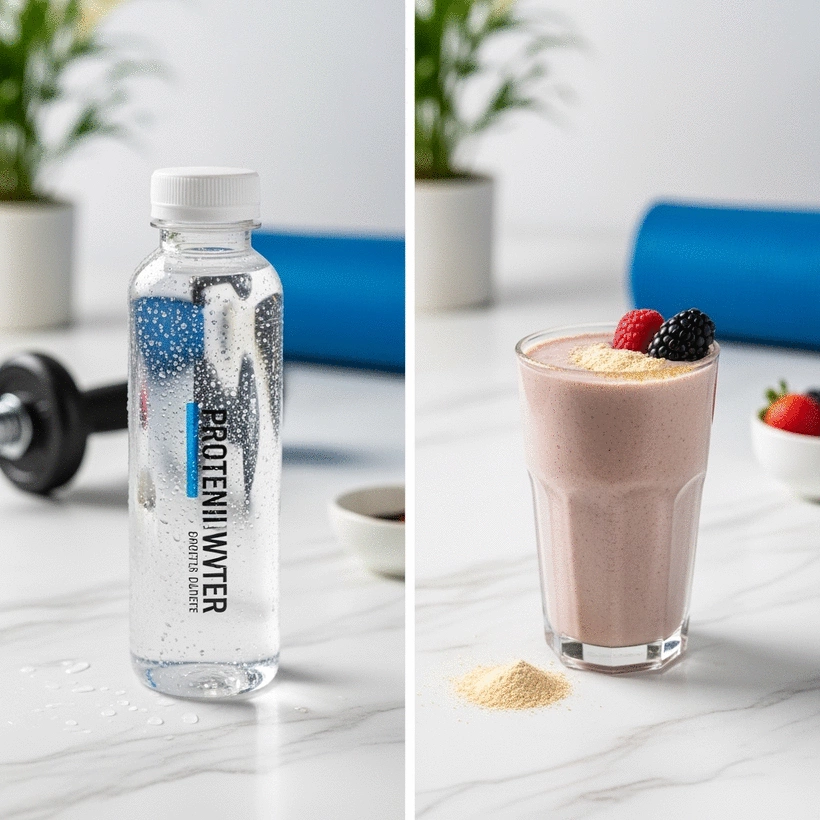
Have you ever found yourself overwhelmed by the variety of protein options available? With new products constantly emerging, it’s essential to understand how protein waters stand out from traditional protein shakes. This guide will clarify their benefits and help you make informed choices for your hydration and fitness needs.
What You Will Learn
- Protein waters are lighter and more hydrating than traditional protein shakes, making them ideal for quick refreshment.
- They typically contain 10-15 grams of protein per serving, which is less than the 20-30 grams found in most shakes.
- Protein waters are convenient for on-the-go consumption, often available in pre-packaged bottles.
- Understanding the different types of protein (whey, casein, plant-based) is crucial for aligning your drink choice with your fitness goals.
- Protein waters should supplement, not replace, traditional protein sources like whole foods, which offer a broader nutrient profile.
- Reading labels is essential to avoid high sugar content and to select products that align with your health preferences.
Protein Water vs. Traditional Shakes: A Nutritional Comparison
Delve into the key differences and nutritional aspects of protein water and traditional protein shakes to make an informed choice for your fitness journey.
Protein Water
- 1 Texture: Lighter & more refreshing
- 2 Protein: 10-15 grams per serving
- 3 Calories: Generally fewer
- 4 Purpose: Hydration-focused, lighter option
Traditional Protein Shakes
- 1 Texture: Thick & filling
- 2 Protein: 20-30 grams per serving
- 3 Calories: Generally more
- 4 Purpose: High protein intake, meal replacement
Understanding the Basics of Protein Water and Traditional Protein Shakes
As a fitness enthusiast and nutrition expert, I've seen a growing interest in protein water, and it’s essential to understand what sets it apart from traditional protein shakes. At Best Protein Water Guide, we aim to simplify this journey for you, ensuring you have the tools to make informed choices about your hydration and fitness. So, what exactly are protein waters, and how do they differ from the usual protein shakes you may be familiar with?
Protein waters are a refreshing blend of water infused with protein, offering a lighter alternative to traditional shakes. Unlike thick protein shakes, which can sometimes feel heavy, protein waters are designed to be hydrating while delivering essential nutrients. This makes them a great option for anyone looking to boost their protein intake without the heaviness of a full shake after a workout!
What Are Protein Waters and How Do They Differ from Traditional Shakes?
Protein waters provide a convenient way to stay hydrated while also getting your protein fix. Here are some key differences:
- Texture: Protein waters are typically much lighter and more refreshing than traditional protein shakes, which can be thick and filling.
- Hydration: They are engineered to quench your thirst while supporting your protein needs, making them ideal for hydration-focused routines.
- Convenience: Protein waters often come in pre-packaged bottles, making them perfect for on-the-go consumption.
These differences make protein waters a unique player in the hydration game. If you're heading to the gym or need a post-workout boost, protein water can be just what you need to stay refreshed and satisfied!
Nutritional Breakdown: Comparing Protein Content and Ingredients
When considering your protein options, it's crucial to look at the nutritional breakdown. Typically, protein waters contain less protein per serving compared to traditional shakes. Here’s a simplified comparison:
- Protein Content: Traditional shakes often deliver 20-30 grams of protein, while protein waters usually offer around 10-15 grams.
- Calories: Protein waters generally have fewer calories, making them a lighter option.
- Additional Ingredients: Many protein waters include added vitamins, electrolytes, or flavors, enhancing their hydrating properties.
This comparison shows that while protein waters provide a valuable protein source, they may not always meet the needs of those looking for high protein intake. It’s essential to assess your fitness goals when making a choice!
Exploring Different Types of Protein: Whey, Casein, and Plant-Based Options
Understanding the type of protein used in your drink can significantly impact your health goals. Here’s a rundown of the most common protein types:
- Whey Protein: Fast-digesting and rich in essential amino acids, making it great for post-workout recovery. Research supports the benefits of whey protein for muscle growth and repair, as highlighted in studies on protein supplementation.
- Casein Protein: Slow-digesting, providing a steady release of amino acids, ideal for overnight muscle recovery.
- Plant-Based Proteins: A good option for vegans and those with lactose intolerance, though they may have lower protein content than whey. More information on the efficacy of different protein types can be found in comprehensive reviews such as those published in Frontiers in Nutrition.
Choosing the right protein source can enhance your hydration and recovery process. At Best Protein Water Guide, we highlight all these options, ensuring you find what fits your individual needs best!
We Want to Hear From You!
What do you think about the role of protein waters in your fitness routine? Have you tried incorporating them into your post-workout recovery? Share your thoughts below:
Common Myths and Misconceptions Addressed
When it comes to protein waters, many myths cloud their potential benefits and uses. As someone who has explored the world of hydration extensively, I find it essential to debunk these misconceptions so you can make informed choices. Are you wondering if protein waters are a complete substitute for traditional protein sources? Let’s dive into these common myths!
Debunking Myths: Are Protein Waters a Complete Substitute?
One prevalent myth is that protein waters can completely replace traditional protein shakes or whole food sources. While protein waters provide a convenient source of hydration and protein, they are not necessarily a full substitute. It's important to recognize that whole foods and traditional protein sources offer a broader range of nutrients that are beneficial for overall health.
- Protein waters are best used as a supplement, not a replacement.
- They often lack essential vitamins and minerals found in whole foods.
- Protein waters can be beneficial for quick hydration post-workout.
So, while they can be an excellent addition to your routine, relying solely on protein waters may not meet all your nutritional needs. Balance is key!
Understanding the Role of Whole Foods in Your Diet
Whole foods play a crucial role in your overall nutrition strategy. They provide not just protein but also healthy fats, carbohydrates, vitamins, and minerals. Incorporating a variety of foods into your diet ensures you're getting a well-rounded intake of nutrients. Consider the following types of food:
- Lean meats, fish, and poultry for high-quality protein.
- Fruits and vegetables for vitamins, minerals, and antioxidants.
- Whole grains for complex carbohydrates and fiber.
By embracing whole foods alongside protein waters, you're setting yourself up for success on your fitness journey. They complement each other beautifully!
Separating Fact from Fiction: Sugar Content and Artificial Sweeteners in Protein Products
Another common misconception involves the sugar content in protein products. Many people think that all protein waters are loaded with sugars or artificial sweeteners. In reality, the sugar content varies widely among brands. It's crucial to read labels and understand what's in your protein water. For further insights into the effects of sweeteners in protein products, consult studies on how artificial sweeteners affect metabolism, such as those found on PMC NCBI.
- Look for options with natural sweeteners or lower sugar content.
- Be aware of the potential impact of artificial sweeteners on digestion.
- Choose products that align with your dietary preferences and health goals.
By educating yourself about the ingredients in your protein waters, you can confidently select products that support your health without unnecessary additives. Remember, knowledge is power!
Making an Informed Decision: Summary of Key Points
As we wrap up this section, it’s clear that understanding the full spectrum of protein options available is crucial for making informed decisions. Whether you're leaning towards protein waters or traditional shakes, consider what aligns best with your personal fitness goals and dietary needs.
Recap of Key Points
Here is a quick recap of the important points discussed in the article:
- Protein waters offer a lighter, more refreshing alternative to traditional protein shakes, making them ideal for hydration.
- While protein waters typically contain less protein (10-15 grams) than traditional shakes (20-30 grams), they often have fewer calories.
- Different types of protein (whey, casein, plant-based) serve varying dietary needs and recovery processes.
- Protein waters should supplement a balanced diet rather than replace whole food protein sources.
- It's essential to check labels for sugar content and choose products that align with your health goals.
Frequently Asked Questions About Protein Waters
- Q: What is the main difference between protein water and traditional protein shakes?
- A: Protein water is lighter and more focused on hydration, typically containing 10-15 grams of protein. Traditional protein shakes are thicker, more filling, and usually provide 20-30 grams of protein, often serving as a meal replacement.
- Q: How much protein do protein waters typically contain?
- A: Protein waters generally contain 10-15 grams of protein per serving, which is less than the 20-30 grams found in most traditional protein shakes.
- Q: Are protein waters suitable for post-workout recovery?
- A: Yes, protein waters can be a great option for quick hydration and a protein boost after a workout, especially if you prefer a lighter alternative to a thick shake.
- Q: Can protein waters replace whole food protein sources?
- A: No, protein waters should be used as a supplement to a balanced diet. Whole foods offer a broader range of essential nutrients, vitamins, and minerals that protein waters typically lack.
- Q: How do I choose the right protein water for my needs?
- A: Consider the type of protein (whey, casein, plant-based) that aligns with your dietary needs and fitness goals. Always check the label for sugar content and other additives to ensure it meets your health preferences.

